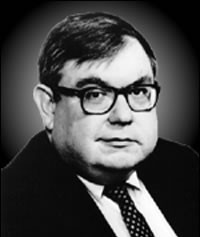 Samuel T. Francis
Samuel T. Francis
Championing
Western Civilization
and the great legacies of
Sam Francis and Joe Sobran
and their allies
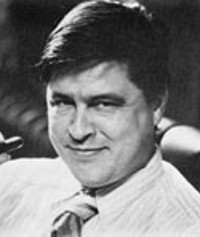 Joseph Sobran
Joseph Sobran
FGF Books Op-Ed
April 29, 2020
[Tom Piatak scrutinizes a First Things article on Samuel Francis on today's 73rd anniversary of his birth. ]
A Giant Beset by Pygmies
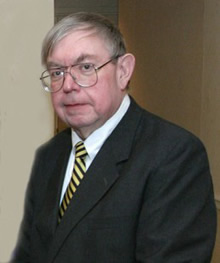
Sam Francis
by Tom Piatak
Chronicles: A Magazine of American Culture — Most newspaper and magazine articles are forgotten not long after they appear. Does anyone read the 25-year-old columns of Norman Podhoretz, William F. Buckley, or Richard John Neuhaus for insight into current events? It therefore tells us something when First Things prints a 20-page essay about a political journalist who has been dead for almost 15 years.
First Things’ lengthy essay on Sam Francis must be regarded as proof that he remains relevant to contemporary debate, and was what many readers of Chronicles knew he was: a genius.
This person, we learn, “won almost no access to major conservative outlets” in life, and indeed was “purged and marginalized.” It tells us even more when the journal running this long essay rarely agreed with the subject during his life. Thus, whatever else it may be, First Things’ lengthy essay on Sam Francis must be regarded as proof that he remains relevant to contemporary debate, and was what many readers of Chronicles knew he was: a genius.
The essay’s author, Matthew Rose, says as much. He describes Francis’ posthumously published Leviathan and Its Enemies as “the most ambitious book by an American conservative in the last quarter-century.” Rose also admits that Francis accurately predicted our current political situation. “His hope for a conservatism rooted in economic nationalism and cultural populism is no longer difficult to imagine,” Rose writes. Francis described “the new right-wing parties coming into view across the Western world.”
Matthew Rose describes Francis’ posthumously published Leviathan and Its Enemies as “the most ambitious book by an American conservative in the last quarter-century.”
Rose also recounts how Rush Limbaugh read portions of Sam’s essay “From Household to Nation” from the March 1996 Chronicles 20 years after its publication, and “hailed it as the Trumpist manifesto that no one, including the candidate, had been able to formulate.” Rose, to his credit, has called attention to a thinker who continues to resonate on the right.
While Francis was being “purged and marginalized,” the editors of Commentary, National Review, and First Things were maintaining that America should use its military power to spread “democracy” around the globe, particularly in the Middle East, while welcoming globalization in the form of free trade and mass immigration. These positions reflected a belief that America wasn't a real country inhabited by a real people, but a mere incubator of ideas, and its people were worthwhile only insofar as they embodied neoconservative ideas.
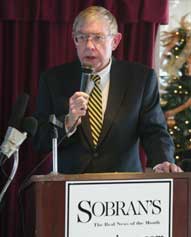
Sam Francis giving a talk on December 4, 2004 titled, “Unpatriotic Neoconservatives”
As a result of such profoundly misguided thinking, thousands of American lives were lost and hundreds of billions of American dollars were wasted on pointless wars in the Middle East, which continue down to this day. Meanwhile tens of thousands of American factories were closed and millions of American manufacturing jobs were lost, while Communist China became the main beneficiary of America’s de-industrialization.
“Sam Francis’ hope for a conservatism rooted in economic nationalism and cultural populism is no longer difficult to imagine.” – from Michael Rose’s article, “The Outsider” in First Things, October 2019.
Owing to mass immigration, the Republican Party was virtually obliterated in many areas, including Orange County, California, which went from being a Goldwaterite bastion to a Republican-free zone. All the while, the left was taking control of our cultural institutions, notwithstanding the happy-talk about the supposed triumph of conservatism flowing from “conservative” publicists.
In sharp contrast, as early as 1989 Francis was telling us that, “Globalization doesn’t mean that America will prevail, but that it will vanish among the electrons and laser beams by which the planet is to be held together.” In the same essay, Francis argued that, “If what remains of the Middle American nucleus of American culture is to survive, it will have to evolve a new nationalist consciousness capable of resisting the global managerial system and of challenging its domestic apologists.”
Rush Limbaugh read portions of Sam’s essay “From Household to Nation” from the March 1996 Chronicles 20 years after its publication, and “hailed it as the Trumpist manifesto that no one, including the candidate, had been able to formulate.”
Francis also saw that “the people and forces now in power in this country — in government, the culture, and Big Business — are the enemies of the real America and the real civilization of the West.” As a result, conservatives needed to stop deferring to elites and instead needed to begin challenging them. The essay written in 1996 that so impressed Limbaugh combined Francis’ nationalism and his populism, arguing that the main faultline in politics was now between an elite promoting globalism and a Middle American core animated by “nationalism and social and cultural conservatism.”
Recent events continue to vindicate Francis’ insights. There is an unmistakable pattern in contemporary politics: any politician who challenges globalism will be subject to unremitting attack, the legitimacy of his rule will be emphatically denied, and every effort will be made to prevent those who voted to challenge globalism from having their votes accepted as legitimate.
Rose, to his credit, has called attention to a thinker who continues to resonate on the right.
Indeed, it is clear that, in elite discourse, “democracy” means a political system producing results that are congenial to elites. Hence, the failure to implement Brexit in Britain; the formation of a new government in Italy, after the intervention of France and Germany, to displace the one led by populist Matteo Salvini; and the persistent efforts to sanction the governments of Poland and Hungary, both of which enjoy strong popular support; not to mention the repeated attempts to remove Donald Trump from office.
Someone who agrees with Francis that politics is about power, that elites see globalization as benefitting them, and that opposition to globalism is therefore seen by elites as a grave threat, will have no trouble making sense of these developments. Those who don’t are instead likely to be confused and easily manipulated. The disastrous impact of those bad ideas teaches a lesson which Francis foresaw: the real threat to our country comes from our elites, and not from outsiders who sometimes embrace unpopular ideas. The elites generate the ideas that most people in positions of influence are too timid to resist, lest they too be “purged and marginalized.”
Francis also saw that “the people and forces now in power in this country — in government, the culture, and Big Business — are the enemies of the real America and the real civilization of the West.”
Not recognizing this, Rose offers a catalogue of Francis’ unpopular opinions, or caricatures of those opinions. Rose states that “Francis’s racism was an open secret,” as shown in part by “years of vehement opposition to affirmative action and a holiday for Martin Luther King Jr.” Rose asserts that, “Francis’s interest in racial differences consumed him in his remaining years.” Further, he evinced “hostility to the role of Christianity in American public life.” Finally Rose asserts that Francis “displayed no feeling for literature, art, music, philosophy, or theology.”
These critical notes ring false. My own regular conversations with Francis during the period of his alleged obsession with racial differences contained little discussion of the topic, and no expressions of racial animus. Francis, unlike the great majority of those who harp on his supposed racism, lived in a largely black neighborhood and enjoyed cordial relations with non-white neighbors. His reservations about elevating Martin Luther King, Jr., to an object of national veneration were widely shared by conservatives in the 1980s, including, among others, President Reagan. His last years included writing a monthly column in Chronicles and a regular syndicated column, few of which focused on racial differences.
The essay written in 1996 that so impressed Limbaugh combined Francis’ nationalism and his populism, arguing that the main faultline in politics was now between an elite promoting globalism and a Middle American core animated by “nationalism and social and cultural conservatism.”
Admittedly, Francis did not share Bill Clinton’s enthusiasm for the fact that whites would become a minority in the United States for the first time in history. But Rose offers no reason why American conservatives are supposed to share the former president’s sentiments. He scorns Francis for “dismiss[ing] all evidence” of societies successfully maintaining their identity after transitioning from one dominant demographic group to another without adducing any such evidence. Here Rose resembles his predecessors at First Things who responded merely with outrage when Chronicles warned about the dangers of mass immigration. The Republican experience in Orange County, the English residents of “Londonistan,” and the French in the banlieues of Paris suggest that Rose’s evidence-free belief in the goodness of radical demographic change is unlikely to age well.
Rose is correct that Francis believed that “as all politics became identity politics…whites would have every reason to assert, and minorities would have no grounds to dispute, their common identity and interests as whites.” But does Rose believe that our present practice of encouraging minorities to organize on racial grounds while blaming whites as a group for social ills is either just or sustainable? Indeed, these tendencies have grown stronger since Francis’ death, with much of the academy and the media now declaiming against “white privilege.” Given the increasingly rancorous state of American politics, Rose’s belief that “Americans [are] united by a political creed” comes across, at best, as an unfounded piety.
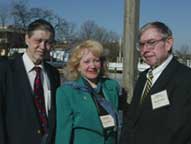
Joe Sobran, Fran Griffin, and Sam Francis on December 4, 2004
Nor was Francis the bitter critic of Christianity that Rose portrays. As Rose notes, Francis exuberantly supported the presidential campaigns of Pat Buchanan, a principled social conservative who has made no effort to conceal his Catholicism. Indeed, Sam once remarked to me that he was struck by the fact that most of the people he was closest to were Catholics. Sam also told me that he had accompanied his nephew, who had married a Catholic, to Midnight Mass when he was back in Tennessee and had enjoyed the experience. He asked conservative activist and publicist Fran Griffin if he could borrow her copy of Brent Bozell’s book recounting his conversion to Catholicism, Mustard Seeds. He also shared with me his enthusiasm for the Christian themes that he detected in the television series that we both enjoyed and often discussed, The X-Files.
Recent events continue to vindicate Francis’ insights.
So, when I heard that Sam had received a Catholic priest on his deathbed, I was grateful, but not surprised. We had often discussed Evelyn Waugh’s novel Brideshead Revisited, which we both loved, and in which Catholicism and conversion is a major theme. Sam’s final moments called to mind Lord Marchmain’s experience on his deathbed in the novel.
Francis foresaw the real threat to our country comes from our elites. … The elites generate the ideas that most people in positions of influence are too timid to resist, lest they too be “purged and marginalized.”
Sam did criticize Christians who seemed to be encouraging civilizational suicide, but he respected those Christians who understood the continuing importance of the West and its constituent nations. Few things are more likely to repel ordinary Americans from Christianity than presenting “woke” progressivism as its purest distillation.
Sam did criticize Christians who seemed to be encouraging civilizational suicide, but he respected those Christians who understood the continuing importance of the West and its constituent nations.
Most of my conversations with my friend included enjoyable discussions of books, movies, and television shows. Far from being indifferent to art, Sam produced it himself — if literary criticism counts as art — as shown by his essays on the film The Godfather (1972), and the fiction of H. P. Lovecraft, which I count as two of the finest studies of film and literature Chronicles has published in its long and illustrious history. And, as a graduate student he wrote a learned dissertation on the English Civil War. Rose’s dismissal of Francis as a philistine could not be further from the truth.
It’s only a shame that Francis isn’t here to respond to Rose himself, and to tell us what will be happening 25 years from now.
###
Copyright @ 2025 Chronicles: A Magazine of American Culture, which published this article in their December, 2019 edition. All rights reserved. Reprinted with permission.
Tom Piatak is a contributing editor of Chronicles: A Magazine of American Culture and was formerly a contributing editor to The American Conservative. His articles have appeared in VDARE, TakiMag.com, Crisis, The Agonist, and the Pittsburgh Post-Gazette, among others.
He has served as the President and Executive Vice President of The Rockford Institute, the Executive Director of The American Cause, and the Ohio Chairman of the Pat Buchanan for President Campaigns in 1996 and 2000.
Tom Piatak was privileged to be among those asked to speak at a gathering of Sam Francis’ family and friends on Lookout Mountain, Tennessee the night before Sam was buried.
Mr. Piatak has a B.A. from Case Western Reserve University and a J.D. from the University of Michigan Law School. He lives in Cleveland, Ohio.
The Fitzgerald Griffin Foundation needs your help to support its mission to preserve Sam Francis’ legacy and to publish timely articles about our nation, culture and society.
You may mail your tax-deductible donation to: Fitzgerald Griffin Foundation344 Maple Avenue West, #281
Vienna, VA 22180
1-877-726-0058
publishing@fgfbooks.com
Or call us toll-free at 1-877-726-0058